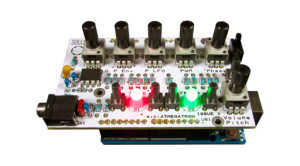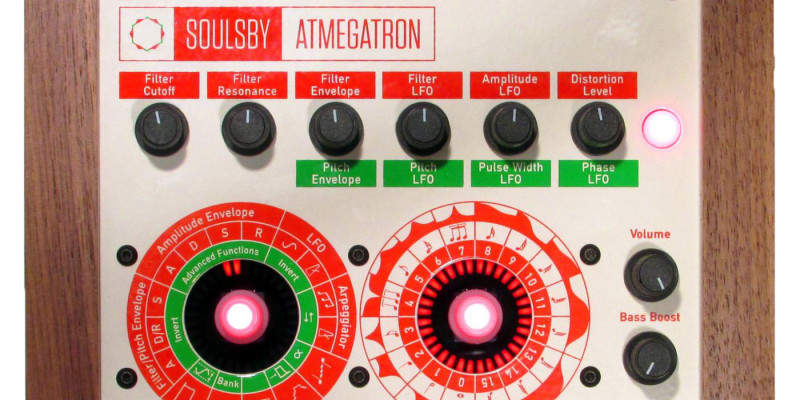Everybody loves hardware synthesisers, and it's no surprise that many makers have used the Arduino platform to create their own synths. However, there is a serious limitation with the Arduino platform; it simply cannot output CD quality audio.
That's not to say that the Arduino can't do 8-bit sounds really well, as demonstrated by the Play V6. Soulsby Synths launched the Atmegatron a while back, and they have recently released version 2, along with a smaller version – the miniAtmegatron.
The Atmegatron is an 8-bit synthesiser based on an Arduino UNO, that can do classic 8-bit and 80s chip-tune sounds extremely well. The Atmegatron can make all manner of wacky and weird sounds, from lead synths and synth basses, to weird filtered sounds and even drums.

The Atmegatron is monophonic and uses PWM synthesis to output the sound. It includes 32 wave table oscillators as standard, and more can be designed using the bundled software. It also features an LFO with variable shape, 2 ADSR envelopes, 15 filters and an arpeggiator. This offers some serious control from a little Arduino.
It also features MIDI input and output, as well as MIDI clock sync, and effects such as wavecrusher, phaser, distortion and bass boost. All this is packaged up in a sleek, white aluminium case, which features walnut end plates. On the front panel are many commonly used controls, for things such as the filter cutoff, envelope, resonance, LFO settings and, of course, a way to trigger the sounds.
The Atmegatron is beautifully presented, and sounds beautiful. Using a unique output filter, the synthesiser manages to keep the high-end of the signal, whilst filtering out all the unwanted noise associated with PWM. The small package also comes with a small pricetag: £199. If you would like an Atmegatron, but the price is a little too steep for you, why not try the miniAtmegatron.

The miniAtmegatron is very similar to its bigger brother, but without the case and with slightly less features. It comes in kit form and requires you to solder it all up yourself. This should take no more than an hour, even for someone with little experience in soldering.
Based on an Arduino UNO, the miniAtmegatron is a shield that slots right into the board. Like the board it is based off, it features 16 wavetable oscillators, 15 filters, an LFO and two envelopes. The most amazing part about this is the price - £29. If you already own an Arduino UNO then you can be up and running with your own chip chain synthesiser in no time at all.
Soulsby Synths have developed an excellent product. Not only is the quality of this synthesiser excellence, but also being based on the Arduino platform, you are free to hack, edit, and upgrade as much as you want. You can grab all the source code for updates and edits before uploading, and there are multiple overlays for the front panel for when you change the functionality of the synthesiser.
You can read more about the two synthesisers at the Soulsby Synths website, or you can watch one the video below.
